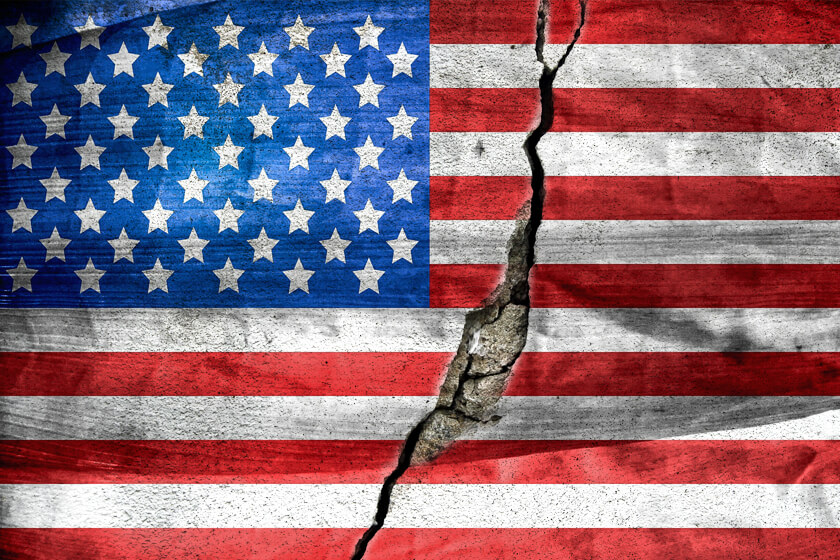West Long Branch, NJ – The vast majority of voters continue to say the country is greatly divided and express concern that the country could suffer lasting damage if people who do not share their own principles hold power. The Monmouth University Poll finds that there has been a partisan shift since the summer of 2016, with Democrats expressing significantly more concern today, while Republican concern has lessened somewhat.
Nearly 7-in-10 registered voters nationwide (69%) say that America is greatly divided when it comes to our most important values. Just 27% say Americans are united and in agreement on these values. These results are nearly identical to how voters felt in the throes of the last presidential election when opinion stood at 70% divided and 27% united in August 2016. The sense that the country is divided is fairly similar among Democrats (74%), Republicans (68%), and independents (66%). But this marks a slight increase in concern from three years ago for Democrats (67%) and a slight decrease for Republicans (73%) and independents (70%).
A majority of the American electorate (57%) expresses a great deal of concern that the country would suffer lasting damage if people who hold core political principles different from their own were able to enact their policies. That number is up from 50% who expressed the same level of concern in August 2016. Another 28% have some concern about potential damage to the country if this happened and just 1-in-10 have not much (7%) or no concern (4%). Majorities of Democrats (66%) and Republicans (62%) have a great deal of concern about this, which is up by double-digits for both groups when compared with August 2016 when Democrats were at 54% and Republicans were at 51%. Currently, 49% of independents feel a great deal of concern that the country could suffer lasting damage from policies they disagree with, which is not much different from the 46% of independents who said the same in 2016.
The poll finds that just 16% of voters have a great deal of trust and confidence in the American people as a whole when it comes to making judgments under our democratic system about the issues facing our country. However, another 44% have a fair amount of trust in their fellow Americans. This 60% overall trust level is similar to where it stood in August 2016 (13% great deal and 47% fair amount), but it is lower than it had been in the past. The Gallup Poll found public trust on this measure at 86% in 1976, at 75% in 2004, and at 64% in 2012. According to Monmouth’s polling, Democratic voter trust in the American people has dropped by 13 points since 2016, from 70% to 57%. Republican trust has increased slightly by 6 points, from 56% to 62%. Independent voter trust has remained more stable, going from 57% in 2016 to 60% now.
“We are seeing a mixed bag of results here. Voters claim they trust the American people to make political decisions, but it seems that may only apply if they actually agree with those decisions. Who controls Washington plays a defining role in partisan opinion here,” said Patrick Murray, director of the independent Monmouth University Polling Institute.
Voters are divided on what is the bigger problem for Washington right now – elected officials who are not willing to compromise (45%) or elected officials who are not willing to stand up for their principles (41%). In August 2016, more voters said the lack of compromise (55%) was a bigger problem than the lack of principled stands (36%). The biggest shift in this sentiment came from Democrats, who went from a greater desire for working together in 2016 (69% compromise and 23% principles) to a nominal preference for taking a stand (42% compromise and 45% principles). Republicans, who wanted more officials to take a stand in 2016 (38% compromise and 52% principles), are now evenly divided between that position and wanting more compromise (44% compromise and 44% principles). Independent opinion has been more stable, with these voters preferring compromise over principled stands in both 2016 (53% compromise and 35% principles) and today (48% compromise and 37% principles).
“We would expect to see some shifts in a desire for cooperation based on which party is in power. But we may be moving into an era where compromise is becoming a dirty word,” said Murray.
Just 30% of voters feel the harsh language used in politics today is justified given the current state of the country, which is similar to public opinion in August 2016 (27%). More than 6-in-10 (62%) say this language is not justified (similar to 67% in 2016). While the overall numbers are the same, there has been a divergence in partisan views with Democrats becoming more tolerant of this type of rhetoric and Republicans becoming less accepting. Currently, 31% of Democratic voters say the harsh language in politics today is justified, up from 15% in 2016. A similar 33% of Republican voters are currently okay with this type of rhetoric, but this is down from 43% three years ago. Independent voter tolerance of harsh political rhetoric has not moved (27% now and 29% in 2016). Among voters who currently support the reelection of President Donald Trump, just 35% say the harsh language in politics today is justified while 56% say it is not. This is a reversal from 2016 when 49% of Trump supporters actually said that this type of language was justified while 45% said it was not.
The Monmouth University Poll also asked American voters if they feel the American way of life is under threat. Half (50%) feel it is under a great deal of threat and 31% sense some threat, while only 1-in-6 say the threat level is either not much (9%) or not at all (7%). These results are nearly identical to August 2016 (47% great deal, 31% some, 13% not much, 7% not at all). Democrats are more likely to feel a great deal of threat to the American way of life now (52%) than they did in 2016 (35%). The opposite is true for Republicans (50% now to 65% in 2016). Independent voter opinion on this issue has not changed (49% great deal now to 48% in 2016).
“The 2016 poll was taken when Hillary Clinton was enjoying her largest lead of the campaign. I said at the time that confidence in the American system is based more on which party they think will hold power rather than an underlying belief in the strength of our democracy. The partisan shift we see on these concerns suggests that sentiment appears to be true today as well,” said Murray.
The poll specifically asked whether voters feel their own personal way of life is under threat based on who wins the next presidential election. While 41% say that their own way of life is threatened by the prospect of Trump being reelected, 56% do not feel this way. Similarly, while 37% say that their own way of life is threatened by the prospect of a Democrat being elected president, 54% do not feel this way. In the summer of 2016, more voters expressed concern about the impact of Trump winning the presidency (54%) than do so about his reelection prospects today. On the other hand, the idea that a Democratic president will threaten one’s way of life is just slightly lower than it was for the prospect of Clinton specifically winning that office in 2016 (42%).
“The contexts are certainly different. We don’t have a Democratic nominee yet and Clinton was riding high at the time the 2016 poll was taken. However, it does appear that nearly three years of a Trump presidency has tempered, if not erased, some of the public’s concern that he would upend our day-to-day lives,” said Murray.
The Monmouth University Poll was conducted by telephone from September 23 to 29, 2019 with 1,161 adults in the United States. The results in this release are based on 1,017 registered voters and have a +/- 3.1 percentage point sampling margin of error. The poll was conducted by the Monmouth University Polling Institute in West Long Branch, NJ.
QUESTIONS AND RESULTS
(* Some columns may not add to 100% due to rounding.)
[Q1-16 previously released.]
Now thinking about government more generally…
17. What causes more problems in the federal government – elected officials who are not willing to stand up for their principles OR elected officials who are not willing to compromise? [CHOICES WERE ROTATED]
|
TREND: REGISTERED VOTER |
Sept. 2019 |
Aug. 2016 |
Jan. 2016 |
Jan. 2015 |
| Not willing to stand up for principles | 41% | 36% | 40% | 37% |
| Not willing to compromise | 45% | 55% | 50% | 54% |
| (VOL) Depends | 9% | 8% | 6% | 7% |
| (VOL) Don’t know | 5% | 2% | 4% | 2% |
| (n) | (1,017) | (803) | (872) | (863) |
18. Which statement comes closer to your view: Americans are united and in agreement about the most important values OR Americans are greatly divided when it comes to the most important values? [CHOICES WERE ROTATED]
|
TREND: REGISTERED VOTER |
Sept. 2019 |
Nov. 2018 | Dec. 2017 |
March 2017 |
Aug. 2016 |
| Americans are united | 27% | 20% | 24% | 20% | 27% |
| Americans are greatly divided | 69% | 77% | 73% | 76% | 70% |
| (VOL) Don’t know | 5% | 3% | 3% | 3% | 4% |
| (n) | (1,017) | (716) | (702) | (722) | (803) |
19. More generally, how much trust and confidence do you have in the American people as a whole when it comes to making judgments under our democratic system about the issues facing our country – a great deal, a fair amount, not very much, or none at all?
|
TREND: REGISTERED VOTER |
Sept. 2019 |
Aug. 2016 |
| A great deal | 16% | 13% |
| A fair amount | 44% | 47% |
| Not very much | 28% | 29% |
| None at all | 11% | 9% |
| (VOL) Don’t know | 2% | 2% |
| (n) | (1,017) | (803) |
20. Thinking about people who hold core political principles that are different from yours, how much does it concern you that our country would suffer lasting damage if their policies were put into place – would you say a great deal, some, not much, or not at all?
|
TREND: REGISTERED VOTER |
Sept. 2019 |
Aug. 2016 |
Jan. 2016 |
| A great deal | 57% | 50% | 53% |
| Some | 28% | 34% | 30% |
| Not much | 7% | 9% | 8% |
| Not at all | 4% | 4% | 5% |
| (VOL) Don’t know | 3% | 3% | 3% |
| (n) | (1,017) | (803) | (872) |
21. Do you feel that the harsh language used in politics today is justified or unjustified given the current state of the country?
|
TREND: REGISTERED VOTER |
Sept. 2019 |
Sept. 2016 |
Aug. 2016 |
Jan. 2016 |
| Justified | 30% | 30% | 27% | 37% |
| Unjustified | 62% | 65% | 67% | 54% |
| (VOL) Language is not harsh | 2% | 1% | 1% | 3% |
| (VOL) Don’t know | 6% | 4% | 4% | 6% |
| (n) | (1,017) | (802) | (803) | (872) |
22. How much do you feel the American way of life is under threat right now – a great deal, some, not much, or not at all?
|
TREND: REGISTERED VOTER |
Sept. 2019 |
Aug. 2016 |
| A great deal | 50% | 47% |
| Some | 31% | 31% |
| Not much | 9% | 13% |
| Not at all | 7% | 7% |
| (VOL) Don’t know | 2% | 2% |
| (n) | (1,017) | (803) |
[QUESTIONS 23 & 24 WERE ROTATED]
23. Do you feel your own personal way of life is or is not under threat from the prospect of Donald Trump being reelected president?
|
TREND: REGISTERED VOTER |
Sept. 2019 |
Aug. 2016* |
| Is | 41% | 54% |
| Is not | 56% | 42% |
| (VOL) Depends | 2% | 2% |
| (VOL) Don’t know | 1% | 2% |
| (n) | (1,017) | (803) |
*Aug.’16 question was asked about the prospect of Donald Trump becoming president.
24. Do you feel your own personal way of life is or is not under threat from the prospect of a Democrat being elected president?
|
TREND: REGISTERED VOTER |
Sept. 2019 |
Aug. 2016* |
| Is | 37% | 42% |
| Is not | 54% | 55% |
| (VOL) Depends | 5% | 1% |
| (VOL) Don’t know | 4% | 2% |
| (n) | (1,017) | (803) |
*Aug.’16 question was asked about the
prospect of Hillary Clinton becoming president.
[Q25-30 previously released.]
METHODOLOGY
The Monmouth University Poll was sponsored and conducted by the Monmouth University Polling Institute from September 23 to 29, 2019 with a national random sample of 1,161 adults age 18 and older, in English. This includes 465 contacted by a live interviewer on a landline telephone and 696 contacted by a live interviewer on a cell phone. The results in this poll release are based on a subsample of 1,017 registered voters. Telephone numbers were selected through random digit dialing and landline respondents were selected with a modified Troldahl-Carter youngest adult household screen. Monmouth is responsible for all aspects of the survey design, data weighting and analysis. Final sample is weighted for region, age, education, gender and race based on US Census information. Data collection support provided by Braun Research (field) and Dynata (RDD sample). For results based on the registered voter sample, one can say with 95% confidence that the error attributable to sampling has a maximum margin of plus or minus 3.1 percentage points (unadjusted for sample design). Sampling error can be larger for sub-groups (see table below). In addition to sampling error, one should bear in mind that question wording and practical difficulties in conducting surveys can introduce error or bias into the findings of opinion polls.
| DEMOGRAPHICS (weighted) |
| REGISTERED VOTERS |
| 27% Republican |
| 42% Independent |
| 31% Democrat |
| 48% Male |
| 52% Female |
| 28% 18-34 |
| 35% 35-54 |
| 37% 55+ |
| 64% White |
| 12% Black |
| 16% Hispanic |
| 7% Asian/Other |
| 66% No degree |
| 34% 4 year degree |
Click on pdf file link below for full methodology and crosstabs by key demographic groups.




